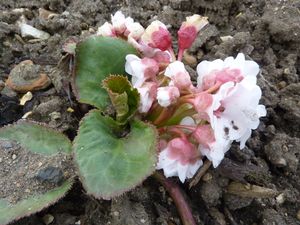Note: This is a project under development. The articles on this wiki are just being initiated and broadly incomplete. You can Help creating new pages.
Difference between revisions of "Bergenia ligulata - Asmabhedaka"
Chaithrika (talk | contribs) m (Chaithrika moved page Paashaanbhed (Prashanbheda) to Asmabhedaka: renaming as per convention) |
Chaithrika (talk | contribs) (+Common names) |
||
| Line 20: | Line 20: | ||
*Cough: 50 ml root decoction with candy sugar is given for one weak. | *Cough: 50 ml root decoction with candy sugar is given for one weak. | ||
| + | |||
| + | ==Common name== | ||
| + | |||
| + | * '''English''' - Winter Begonia | ||
| + | * '''Kannada''' - ಅಲ್ಪ್ಗಯ | ||
| + | * '''Hindi''' - Silphara | ||
== References == | == References == | ||
Revision as of 16:36, 7 March 2017
Bergenia ligulata [1] (Paashaanbhed, Prashanbheda, and other spellings in Ayurveda traditional Indian medicine) is a plant belonging to the family Saxifragaceae and the genus Bergenia. The plant is mostly found in temperate Himalayas from Kashmir to Bhutan and in Khasia hills at 15,00 meter altitude.
Medicinal Uses
- Pashanbheda is used in Ayurveda and Unani system of medicine for treatment of many diseases especially for urinary stones. The plant roots has cooling, laxative, analgesic, abortifacient (abortion causing) and aphrodisiac properties.
- The roots are used in treatment of vesicular calculi, urinary discharges, excessive uterine haemorrhage, diseases of the bladder, dysentery, menorrhagia, splenic enlargement and heart diseases. Ayurveda mentions, the roots as bitter, acrid, post digestion pungent and cool in potency. It is tridoshnashak (balances Vata, Pitta and Kapha).
- Teething troubles: The roots are rubbed down and given with honey to children when teething.
- Ear pain: The leave juice is extracted in mortar and pestle. This is used as ear drops to cure earache.
- Intestinal parasites roundworms: About 10 g of root paste or juice is taken orally by human adults with the molasses, twice a day for 3-4 days.
- Cuts, boils, wounds and burns: Dried roots paste is applied externally on affected body parts.
- Urinary disorders, stomach disorders and urogenital complaints: Decoction of fresh roots is taken orally for treating these conditions.
- Constipation: Root paste is taken with lukewarm water.
- Dysentery: Approximately 5-10 g root powder is taken with fresh water, two times a day.
- Fever: The root powder tea is given to treat fever.
- Cough: 50 ml root decoction with candy sugar is given for one weak.
Common name
- English - Winter Begonia
- Kannada - ಅಲ್ಪ್ಗಯ
- Hindi - Silphara
